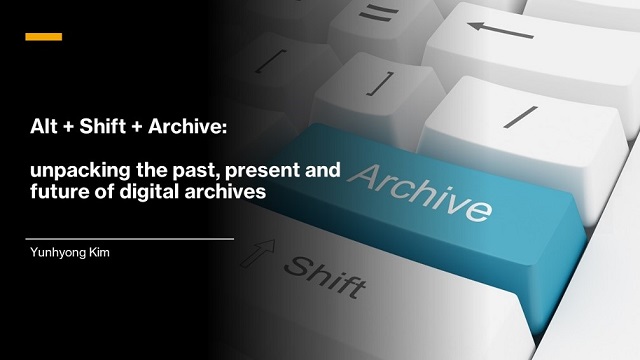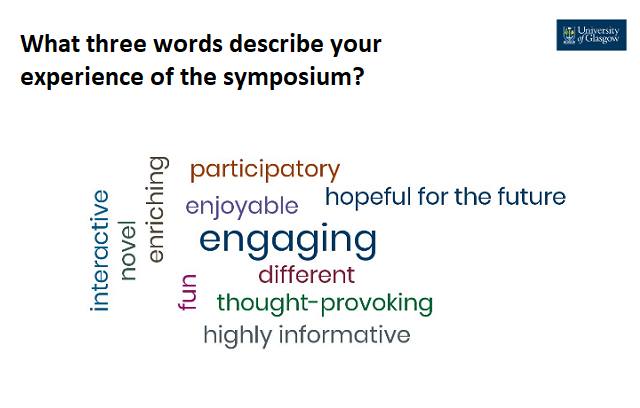At the end of September 2021, the AHRC project The Legacies of Stephen Dwoskin’s Personal Cinema (AH/R007012/1) hosted the Alt + Shift + Archive symposium, bringing together a wide range of representatives from archives as well as researchers and artists who use archives in their practice. The symposium took on an innovative asynchronous format online to allow easier global participation and to accommodate diverse work patterns. Three two-hour Live Q&A sessions were also added to allow non-textual engagement and deeper exploration of key interest areas.

Themes included discussions around the State of the Archive, Alternative Archives, and Shifting Archives, with the aim of capturing presentations of current work, emerging trends and future directions for digital archives. Topics covered a wide range of areas generating active conversations around sensitive and personal data, access and discovery, the use of archival materials, as well as digital inclusion and exclusion. New forms of material such as running as a record and memes as intangible heritage signalled some intriguing areas for exploration going forward. In parallel there were some older recurring discussions on whether coding should be part of the archivist training and the concept of completeness both on an archive and file level, resulting in the key message to keep an “open mind”. There was a visible presence of artificial intelligence throughout, discussed as a tool for the archives, as a means of exploring the archive, as a medium for creating art, and as a gateway to understanding ourselves, authenticity and trust. The symposium conveyed a sense of the current state of the archive as a diverse range of alternative archives – perhaps emphasising the shifting roles and relationships between archivist, art and researchers.
Contributions came from people at the Thailand Film Archive, Ithaka Reveal Digital and S&R, The National Archive UK, the National Library of Scotland, JISC, Digital Curation Centre, Transport for London, V&A Museum, Good Things Foundation, Glamorgan Archives, Digital Preservation Coalition, University of Glasgow Archives and Special Collection, as well as researchers at Masaryk University, Princeton University, Chulalongkorn University and Princess Maha Chakri Sirindhorn Anthropology Centre, University College London, University of Cambridge, University of Glasgow, University of Sheffield, and University of Reading.
The symposium had a healthy. 71% attendance rate (registration to discord presence ration). The symposium received positive feedback. Engagement with multiple stakeholder communities served to deliver a change of perception “particularly with some of the artistic overlap” and the opportunity to “hear first-hand from the various practitioners whose work involves using archive material, along with how the custodians of archives are trying their best to ensure material is made accessible”.

The social media for the symposium only started advertising publicly in the middle of August, yet it was able to reach 17700 impressions and 5,715 visits in September alone. The richness of the event evidence by cross-disciplinary discussions throughout the symposium, between subject specialist researchers, archivists and research data mangers, and artistic practitioners. The symposium was described as “thought-provoking”, “engaging”, and “highly informative”, encouraging the project members to consider a repetition of the event going forward beyond the project.
Rachel Garfield is a Professor in the Department of Art, Yunhyong Kim is a Lecturer and Zoe Bartliff a post-doctoral research assistant in the School of Humanities at the University of Glasgow.
Key people involved in the symposium:
Dwoskin Project: Principal Investigator Rachel Garfield, Co-Investigator, Jenny Chamarette, post-doctoral research associate Henry Miller (all Department of Art), Archivist Guy Baxter (University Museums and Special Collections Service).
Presenters: Christine Ellison (Department of Art), Jenny Chamarette (Department of Art), Guy Baxter (University Museums and Special Collections Services), Robert Darby (Research Engagement team).
Organisers: Guy Baxter (University Museums and Special Collections Service), Co-Investigator Yunhong Kim (University of Glasgow); Co-Investigator Frank Hopfgartner (University of Sheffield); post-doctoral research associate Zoe Bartliff (University of Glasgow)
